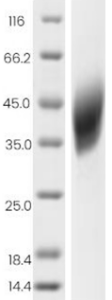Rat CD86 Protein, His Tag
-
产品编号
KMP2296
-
别名
T 淋巴细胞活化抗原 CD86, T-lymphocyte activation antigen CD86, CD86
-
规格
- 50ug
- 100ug
- 200ug
| Catalog Number | KMP2296 |
| Alias | T 淋巴细胞活化抗原 CD86, T-lymphocyte activation antigen CD86, CD86 |
| Size | 50ug, 100ug, 200ug |
| Product Description | The Rat CD86 Protein(KMP2296) is produced in HEK293 Cells and the target gene encoding Vla29-Lys247 is expressed with a 6His tag at the C-terminus. |
| Molecular Name | CD86 |
| Product Introduction | CD86(B7-2):免疫球蛋白超家族跨膜蛋白,与CD80协同作用,提供T细胞活化的共刺激信号。 |
| Molecular Weight | 25.87 kDa |
| Expression System | HEK293 Cells |
| Species | Rat |
| Purity | >95% |
| SDS-PAGE |  |
| Purification | Affinity Purification |
| Uniprot ID | O35531 |
| Storage Condition | Aliquot and store at -20℃ to -80℃. Avoid repeated freezing and thawing cycles. |
| Formulation | PBS, pH7.4 |
| Shipping Condition | In general, the proteins are provided as lyophilized powder which are shipped at ambient temperature. They are shipped out in dry ice if supplied in liquid form. |
| Background | T-lymphocyte activation antigen CD86(B7-2) is a glycosylated protein in the B7 family. B7 family members are transmembrane cell surface molecules that play important roles in immune activation and the maintenance of immune tolerance. It is highly expressed on activated antigen presenting cells. CD86 involved in the costimulatory signal essential for T-lymphocyte proliferation and interleukin-2 production, by binding CD28 or CTLA-4. It may play a critical role in the early events of T-cell activation and costimulation of naive T-cells, such as deciding between immunity and anergy that is made by T-cells within 24 hours after activation. It is expressed by activated B-lymphocytes and monocytes and promoted by MARCH8 and results in endocytosis and lysosomal degradation. |
| Endotoxin | <1.0 EU/ug determined by the LAL method |
| Product Declaration | 该产品仅供科研使用,不可直接用于人体或注射。 |
可优化表达条件(如降低诱导温度、调整IPTG浓度)、使用促溶标签(如SUMO、GST)、共表达分子伴侣,或尝试不同宿主系统(如哺乳动物细胞或昆虫细胞)以提高可溶性蛋白产量。
常用的纯化方法包括亲和层析(如His-Tag、GST-Tag)、离子交换层析、疏水相互作用层析(HIC)和凝胶过滤层析。具体方法取决于蛋白特性和标签类型。





 0
0
